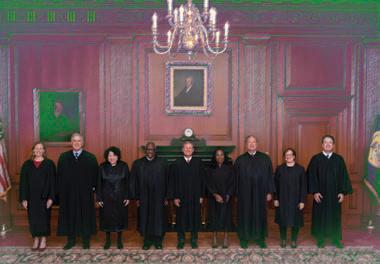
The justices have already agreed to decide whether social media companies can be held liable for promoting harmful content posted by their users. Until now, the answer has been no, with federal appeals courts saying a provision known as Section 230 grants them sweeping immunity.
Enacted as part of the 1996 Telecommunications Act, Section 230 is widely credited with helping the internet flourish, giving platforms assurance that they wouldn’t be at risk of lawsuits for things their users post. But the provision is increasingly drawing criticism from both sides of the political aisle. Conservatives including former President Donald Trump complain Section 230 shields tech companies that censor right-wing voices, while many liberals say it lets platforms ignore hate speech and extremism.
The case before the court involves a suit against Alphabet Inc.’s Google by the family of Nohemi Gonzalez, a 23-year-old US citizen who was among 129 people killed in coordinated attacks by the Islamic State group in Paris in November 2015. Gonzalez’s family says Google’s YouTube service, through its algorithms, violated a federal anti-terrorism law by recommending IS videos to other users.
Denne historien er fra January 16, 2023-utgaven av Bloomberg Businessweek US.
Start din 7-dagers gratis prøveperiode på Magzter GOLD for å få tilgang til tusenvis av utvalgte premiumhistorier og 9000+ magasiner og aviser.
Allerede abonnent ? Logg på
Denne historien er fra January 16, 2023-utgaven av Bloomberg Businessweek US.
Start din 7-dagers gratis prøveperiode på Magzter GOLD for å få tilgang til tusenvis av utvalgte premiumhistorier og 9000+ magasiner og aviser.
Allerede abonnent? Logg på

Instagram's Founders Say It's Time for a New Social App
The rise of AI and the fall of Twitter could create opportunities for upstarts

Running in Circles
A subscription running shoe program aims to fight footwear waste

What I Learned Working at a Hawaiien Mega-Resort
Nine wild secrets from the staff at Turtle Bay, who have to manage everyone from haughty honeymooners to go-go-dancing golfers.

How Noma Will Blossom In Kyoto
The best restaurant in the world just began its second pop-up in Japan. Here's what's cooking

The Last-Mover Problem
A startup called Sennder is trying to bring an extremely tech-resistant industry into the age of apps

Tick Tock, TikTok
The US thinks the Chinese-owned social media app is a major national security risk. TikTok is running out of ways to avoid a ban

Cleaner Clothing Dye, Made From Bacteria
A UK company produces colors with less water than conventional methods and no toxic chemicals

Pumping Heat in Hamburg
The German port city plans to store hot water underground and bring it up to heat homes in the winter

Sustainability: Calamari's Climate Edge
Squid's ability to flourish in warmer waters makes it fitting for a diet for the changing environment

New Money, New Problems
In Naples, an influx of wealthy is displacing out-of-towners lower-income workers